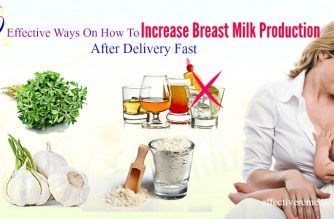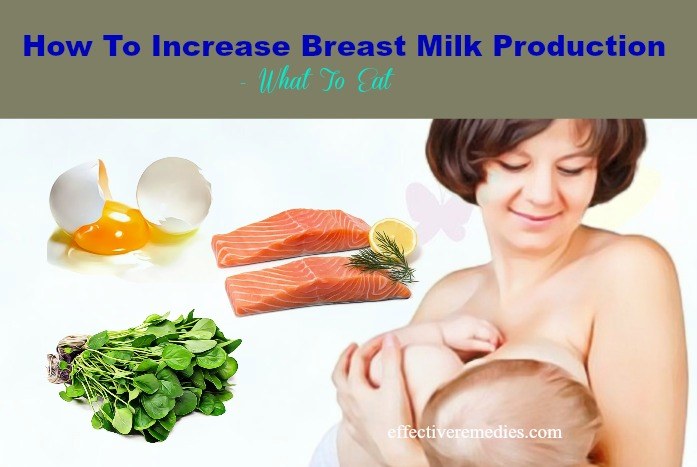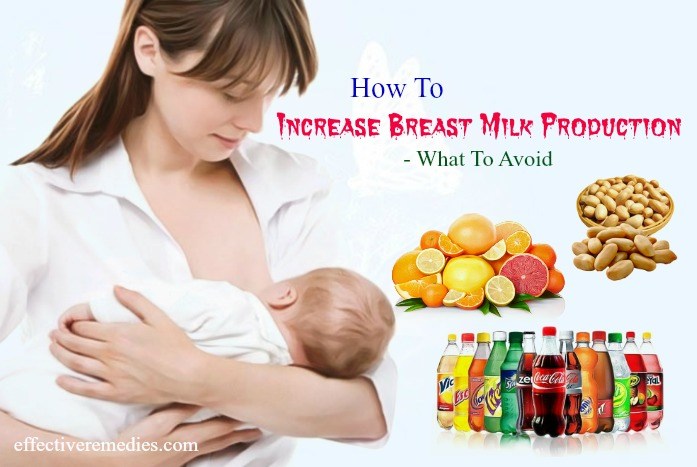Overview
There are many reasons why the World Health Organization (WHO) said that babies should be breastfed until 6 months old. Breast milk consists of many nutrients such as proteins, fats, carbohydrates, vitamins, trace elements, and minerals that match a newborn baby’s needs for proper brain development and a healthy immune system. However, many babies struggle to meet the nutrition needs because of their mothers’ insufficient lactation. There are various reasons for this, according to Johns Hopkins Medicine, such as mothers’ misconceptions about the amount of milk production, and medical treatment during pregnancy or after delivery. Fortunately, most cases are uncommon and can be improved with appropriate methods. Our article today on Effective Remedies will show you 19 easy ways on how to increase breast milk production fast after delivery.
19 Effective Ways How To Increase Breast Milk Production After Delivery Fast
I. What Are The Benefits Of Breastfeeding For Mother And Child?
Children who are breastfed are more likely to be protected from viruses, bacteria, and parasites thanks to the immunologic agents and compounds in breast milk, which result in a reduction in the rate of asthma or allergies, respiratory illnesses, and diarrhea among children.
Breastfeeding also benefits the nursing mothers. Many of them experience less blood loss, better uterus shrinkage, and lower risks of breast and ovarian cancers, especially among young mothers.
II. How To Increase Breast Milk Production – What To Eat
1. Oatmeal
Oatmeal is a wonderful addition to a nursing mom’s diets thanks to the following benefits.[1] Firstly, oatmeal is an excellent source of nutrition such as beta-glucans, phytochemicals, protein, fiber, and carbohydrates; these fibers are believed to be able to increase the breastfeeding hormone, prolactin. As oatmeal is a rich source of iron, increasing oatmeal intake contributes to treating conventional low iron and boosting breast milk production after birth. Oatmeal is also said to be a kind of comfort food. Research reports that oatmeal contains vitamin B, which increase positive energy; enlighten mood and decrease exhaustion and depression. Furthermore, the oxytocin in this food is associated with a better ability to produce breast milk.
Fortunately, oatmeal is widely available and accessible to prepare. Oatmeal porridge has always been a quick solution for mothers. Having a bowl of oats with a glass of milk can escalate a mother’s breast milk production. Try making some oatmeal smoothies; they are also wonderful choices to munch for breakfast or afternoon snack. You can also bake oatmeal in bread or add to soup; both of them are convenient and healthy options for your three meals per day.
While oatmeal is considered a healthy food without any side effects, it is still better not to overeat it. A lot of nutrients from oatmeal absorbed into your body can cause difficulties in digestion. Besides, sticking to one type of food from particular food groups may result in the lack of vitamins, minerals, proteins and other healthy fibers that different food groups can provide.
2. Garlic
Garlic, traditionally, has been considered as a beneficial supplement to nursing mothers' diets. If a mother eats a significant amount of garlic, it can enhance the smell of her breast milk, which is useful for a long breastfeeding time. Garlic contains minerals, vitamins and amino acids that are essential and helpful for milk production among mothers. Additionally, eating garlic during breastfeeding may help protect mothers and children from harmful infection and boost their immune system.
Research into how garlic consumption affects breast milk has guaranteed that it is safe to take from 2 to 3 cloves of garlic daily to increase breast milk supply in new mothers. Garlic serves as a great taste enhancer when added to daily food such as meat, seafood or vegetables. A reasonable amount of garlic is right for you and your baby. Although, it is recommended that you should avoid eating in large quantity.
However, while eating garlic, you should take into consideration a number of its side effects. Some babies cannot tolerate the smell of garlic in the mothers’ milk. If your baby turns fussy during breastfeeding, you should stop. If your baby suffers from colic, garlic should be eliminated from your diets. In cases you have specific medical issues, it is better to seek advice from doctors before adding garlic in your meals.
3. Spinach
Spinach, like other vegetables, is exceedingly nutritious and easy to digest for lactating mothers. A considerable amount of nutrition can be found in spinach such as iron, phosphorus, calcium, magnesium, vitamin K, A, B6 and folic acid. Folic acid, or folate, is actually among the essential nutrition for mothers who are breastfeeding, while vitamin B6 plays a significant role in promoting breast milk production.
Since most nutrients contained in spinach are essential for nursing mothers and infants, it is recommended to be a part of your regular meals. Cooked spinach is safer than the raw one as fresh spinach can contains harmful bacteria, which is dangerous to the infants’ health. Furthermore, raw spinach contains oxalic acid, phytic acid, and polyphenols that can prevent the mother’s body from absorbing iron and calcium. In short, make sure you consume spinach reasonably as overeating of it can be unhealthy for both you and your baby.
4. Salmon
Salmon is often introduced as a healthy foodstuff for almost everybody, thanks to its excellent content of omega-3s and essential fatty acids. Therefore, it is a great option to increase breast milk supply among nursing mothers. DHA, one of these essential fatty acids available in salmon, is known to be a critical component of breast milk and plays a crucial role in the development of babies’ brains. The more DHA a mother consumes, the more DHA her breast milk contains. Studies also suggest that DHA in salmon can also enlighten mothers’ moods; hence it helps prevent postpartum depression as high-stress levels have been proven to lower women’s milk supply. Therefore, the sooner you add salmon into your diet, the better it works for your health.
For recommendation, a mother should take from 2 to 3 servings of salmon per week. They can eat grilled, boiled or steamed salmon to meet their body’s needs. All can provide excellent results. However, that should be the limitation. According to Medical Daily, excessive intake of salmon during breastfeeding may cut antibody contents in breast milk, leading to a higher risk of infection among babies. Furthermore, the FDA warns that even though the level of mercury in salmon is relatively low, it is never unnecessary to be careful with this toxic content.
5. Eggs
An egg is another enormously beneficial part of the diet for a lactating mother. Eggs are loaded with a significant number of nutrients, vitamins such as A, B2, B12 and several minerals such as folate, selenium, phosphorous, calcium, and zinc. In particular, vitamin A is of the great importance in complementing lactation and boosting a nursing mother’s quality of milk. Vitamin B12 is vital to produce new proteins that build blocks of the body and increase immune nutrients in breast milk. B2 helps with the absorption of iron of the body, which is also a must for breastfeeding mothers and helps promote milk supply.
You can have soft or hard boiled eggs in the breakfast or lunch or egg curry and omelet for dinner. A mother usually requires an extra 500 calories per day to meet her baby’s nutritious needs; therefore, consuming more eggs is never a wrong choice. However, if you notice any symptoms such as nausea, rashes, colic, discomfort or breathing problems in your babies, it is likely that your baby suffers from the egg allergy. If that is the case, stop eating eggs immediately. Neither should you consume raw eggs during the breastfeeding period since it can result in diarrhea, vomiting, stomach cramps, nausea, and fever in your babies.
Above are five superfoods that can help lactating mothers on how to increase breast milk production, all of which can be easily found and added to regular diet. However, it is still recommended that you consult a doctor in case of specialized medical treatment before including one in your meals.
III. How To Increase Breast Milk Production – What To Avoid
1. Alcohol
Traditional medicine believed that drinking beer can help the nursing mother relax, produce more breast milk and improve the quality of the milk. However, nowadays, it is pointed out that alcohol can block the production of oxytocin, which will later reduce the number of letdowns each time the mother breastfeeds. Also, it is warned that the breast milk supply will be significantly decreased after only one night of heavy drinking. Therefore, keep away from alcohol to ensure the amount of milk supply for your baby.
2. Caffeine And Chocolate
One or two cups of caffeine each day is acceptable but consuming a significant amount of caffeine will harm both mother and baby’s health, primarily, it affects breast milk a lot. Your baby’s body cannot process caffeine as quickly as yours; so, if you want your baby to have a sound sleep, do not drink coffee until your baby sleeps.
It is so amazing that chocolate is also a rich source of caffeine. Therefore, if you do not drink coffee but eat chocolate, your body will also absorb caffeine. It is believed that chocolate can bring your baby laxative effect; however, if you realize that your baby becomes fussy or has a runny nose, stop eating chocolate, or else, the problem will be many times worse.
3. Dairy
Dairy is one of the common foods that a mother consumes while breastfeeding. However, it can cause problems such as fussy, skin issues such as eczema or pimples and even sleep issues in your babies. Whenever you see these problems, stop drinking dairy for a few weeks. If you realize the improvement, a dairy allergy must be the cause.
4. Peanuts
In case you have a history of peanut allergy, avoid this type of food altogether as the allergic substances in peanuts can be easily transmitted from mother to child through breast milk. However, if you have never got trouble with eating peanuts, watch your baby’s symptoms. If your baby presents any rash or hives, it may be caused by peanut allergy. In this case, you can do nothing rather than stop eating peanut immediately.
5. Sugary Drink
Breastfeeding can make the mothers thirstier than usual. In this case, many of them often choose the sugary drink to satisfy their thirst without knowing that it is incredibly harmful to their child’s health. Sugary drinks such as soda or fruit juice will give you more calories without any nutrition. Drinking soda also lowers the quality of breast milk, which will later bring adverse effects to the development of your baby as they are not provided with enough nutrition. Therefore, if you feel thirsty after breastfeeding, try to drink a cup of fresh water, instead of thinking about soda or fruit juice.
Read more: 10 unexpected health benefits of drinking warm water not many people know
6. Citrus
As your baby’s digestive system is not mature, it is unable for him to absorb the robust nutrition in citrus. Therefore, eating citrus will bring no benefit to your child but irritate his intestines. Your child may become fussy or have rash when you overeat citrus. Good advice for you is to consume mango or pineapple, instead of orange, if you are crazy for vitamin C.




